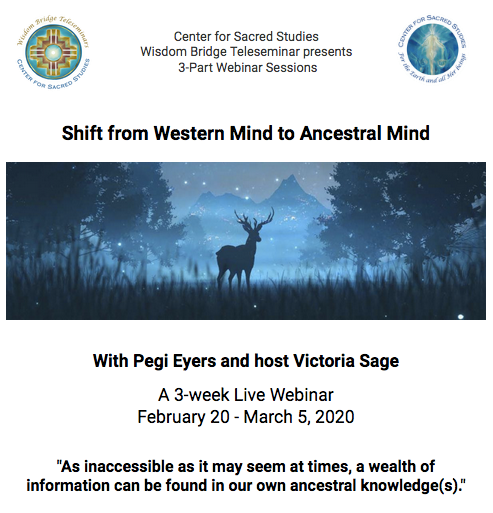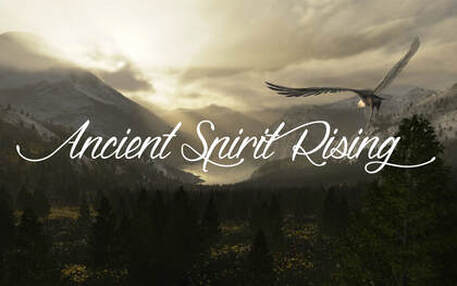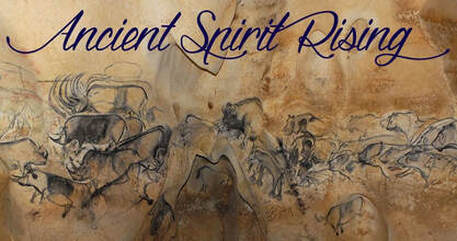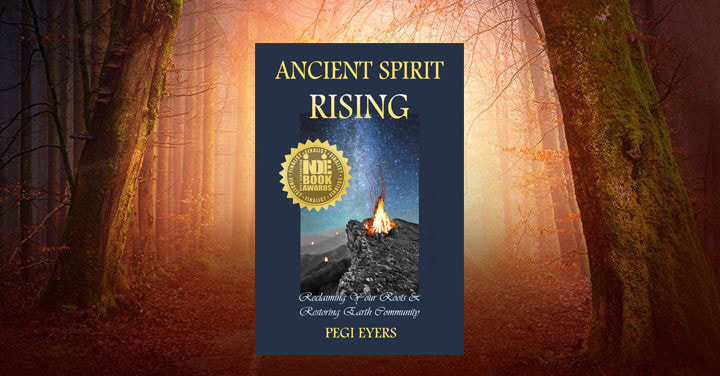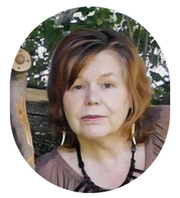Webinar Series with Pegi Eyers, Hosted by Victoria Sage
In a special 3-part WISDOM BRIDGE webinar series, Pegi Eyers shared why reclaiming ancestral mind is essential to re-rooting ourselves and falling in love with the Earth again, to revere the many elements, manifestations, and creatures as sacred, and to return to peaceful co-existence and respect for all life. To be in alignment with our own heritage is to find empowerment and actualization as a true human being. Our reclaiming process also includes the re-inhabitation of place (or getting to know the unique features of our home landscape), and we have a responsibility to embrace geo-justice and the hard work of caring for and protecting the land. Pegi spoke about how an authentic self-identity can be reconstructed from old/new earth-centered societies, using the timeless values of Indigenous Knowledge (IK) as our model. Hosted by Victoria Sage on February 20, February 27 and March 5, 2020, the recordings and accompanying materials for Shift from Western Mind to Ancestral Mind are still available >HERE< !!
SESSION 1
Ancient Spirit Modern Voice ( February 20, 2020)
Ancestral wisdom for the modern world as sourced from the land
Examples of Indigeneity from cultures worldwide, including those in Old Europe
The relevance of Indigenous values to our lives today
Shifting from western thinking to ancestral mind
Nature spiritualities emerging today such as eco-mysticism and rewilding
The shift from "me" to "we," reviving Earth Community and placing nature at the center of our lives
Ancient Spirit Modern Voice ( February 20, 2020)
Ancestral wisdom for the modern world as sourced from the land
Examples of Indigeneity from cultures worldwide, including those in Old Europe
The relevance of Indigenous values to our lives today
Shifting from western thinking to ancestral mind
Nature spiritualities emerging today such as eco-mysticism and rewilding
The shift from "me" to "we," reviving Earth Community and placing nature at the center of our lives
SESSION 2
Ancestral Connection (February 27, 2020)
Genealogy and tracing our family tree, DNA testing for more in-depth exploration
Epigenetics, soul memories, historical and intergenerational trauma
Benefits of Ancestral connection
Non-linear modalities such as visions, intuitions, dream archaeology and other metaphysical
journeys to meet and consult with the Ancestors
Invoking the wisdom and guidance of the Ancestors as a part of our daily spiritual practice
Ethnoautobiography, animism, and the re-enchantment of cultural stories and landscapes
Thanking the human/other-than-human ancestors as an extension of our gratitude for Earth Community
Ancestral Connection (February 27, 2020)
Genealogy and tracing our family tree, DNA testing for more in-depth exploration
Epigenetics, soul memories, historical and intergenerational trauma
Benefits of Ancestral connection
Non-linear modalities such as visions, intuitions, dream archaeology and other metaphysical
journeys to meet and consult with the Ancestors
Invoking the wisdom and guidance of the Ancestors as a part of our daily spiritual practice
Ethnoautobiography, animism, and the re-enchantment of cultural stories and landscapes
Thanking the human/other-than-human ancestors as an extension of our gratitude for Earth Community
SESSION 3
Social Justice Responsibility (March 5, 2020)
The weaving of social justice into our spiritual path
Settler-Colonial histories on Turtle Island
Acknowledging white privilege today, and current societal realities
Addressing “new age” practices such as cultural appropriation
“Giving back,” good allyship and solidarity with marginalized groups
Developing good intercultural competency skills
Respect for “the other” and peaceful coexistence, as modeled to us by First Nations
Social Justice Responsibility (March 5, 2020)
The weaving of social justice into our spiritual path
Settler-Colonial histories on Turtle Island
Acknowledging white privilege today, and current societal realities
Addressing “new age” practices such as cultural appropriation
“Giving back,” good allyship and solidarity with marginalized groups
Developing good intercultural competency skills
Respect for “the other” and peaceful coexistence, as modeled to us by First Nations
